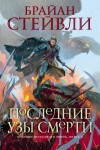Двое братьев и сестра, потомки правящей династии, разобщены и растеряны, в то время как будущее Аннурской империи находится на острие клинка: к столице приближаются орды диких кочевников. Адер, провозгласившая себя императором, не сможет долго сдерживать их наступление без помощи гениального, нечеловечески жестокого полководца – кенаранга Рана ил Торньи. Но что, если он снова предаст Адер? Сумеет ли она противопоставить свою волю и разум его чудовищному интеллекту?.. Ее брат Каден, который...
A roar erupted in his throat, a cry that had been surging up through all the fabric of his flesh since Ha Lin died, rising and growing until it seemed too large for the body that contained it, as though that body had dissolved beneath the pain and the rage, leaving behind a man that was not a man at all, but a scream in the shape of a man, a sob of fury dying to shake free its last mortal bond.
"Life is..." "Suffering," she said again. "Pain is suffering because we want to be free of it, and pleasure is suffering because we fear to lose it."
"There are more shades to the suffering of men than there are colours in the forest. I can draw more notes from a woman bound than a harpist can from her crude arrangement of wood and string." ... "There is no instrument like man, no musical counterpoint like the play of terror and hope, the bafflement and aching clarity that you can draw from his distended flesh." The shaman's voice was lower and slower than it had been. Reverential. Incantatory. "This is art. This is true beauty."
"Your way of war is a pale, ugly thing. A perversion. You call yourselves civilized, and yet look at the things you fight for: borders, power, wealth..."
"As opposed to what?"
"As opposed to nothing. The war itself is worship."
"A sick sort of warship."
"Sicker than killing a woman because she stepped across an invisible line you have drawn across the dirt? Sicker than burning a man because he took some gem, some brick of gold, from another man?"
"The monks told me a lot about what to destroy," he went on after a while. "They question they never answered, though, was this: when you scrub it all out, the fear and hope, the anger and despair, all the thousands habits of thought - what's left?"
Triste didn't respond. The chorus behind them rose and fell, rose and fell like the wind. When he finally looked over at her, she was watching him. Her words, when she spoke, were thin as the wind.
"Why does there need to be somethings left?"
"I thought we should be saved, that humanity should be saved, that we were worth saving, but that was just a habit. Just a hope." "Like everything else," Triste whispered. Kaden nodded. "What if it's wrong?"
What agony could I sustain without hope? What hatred without the promise of love? What pain is there when there is only pain?
